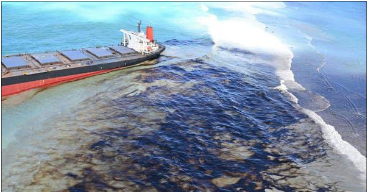Governance failures in shipping
Mauritius is reeling from a spreading oil spill – and people are angry with how the govern-ment has handled it
The recent Beirut tragedy –a deadly explosion of ammonium nitrate in long-term port storage –and now this Mauritius incident raise questions about governance and security in international shipping. Ships can be registered (flagged) in any country of choice, meaning owners are able to find jurisdictions with least regulations. As a Forbes article suggested: “It is unclear how effective the regulators of the flagged nations were in ensuring the safety of the vessel, port, crew and locations through which the vessel travelled.” This will need to be investigated.If the grounding of MV Wakashio and its destruction of environment and livelihoods can become a lesson for the global leaders who can bring about change, maybe we can at last have international shipping fit for the modern world.On August 7, nearly two weeks after the shipwreck, the government declared the incident a national emergency.
With at least 1,000 tons of fuel oil estimated to have already emptied into the lagoon, two ships moved alongside to transfer off remaining fuel in a race against time as the vessel threatened to shear into two.And local sentiment seems to be unanimously negative about the government’s slow response and lack of action targeting the slick.Why the mistrust? Just four years ago on June 17 2016 another bulk carrier, the MV Benita, ran aground in Grand Port just 7km along the coast to the south. I was in Mauritius when this happened and looked out at the MV Benita (which had a fifth the cargo capacity of MV Wakashio) from the beach at Blue Bay.
There had reportedly been a fight on board and the ship had lost power, before drifting to Mauritius –without coming to the attention of the national coastguard. How the ship could simply crash into Mauritius without the authorities knowing bewildered people locally.The vessel was there for five weeks before it was finally refloated, thankfully the oil having been taken off without major spillage or tank rupture. It was being towed to be scrapped in India when it then sank 90km offshore from Mauritius.
Satellite evidence suggests in July 2020 the MV Wakashio had been on a clear direct collision course with Mauritius for several days and hit the reefs at Pointe D’Esny with ocean cruising speed maintained, meaning the government was again likely taken by surprise. The same evidence suggests it took six days for the government to even send out a tug to try to refloat the ship.
Local fishermen depend on the now oil-polluted lagoon for their livelihoods and local people depend on it for most of the fish they eat. Many local small businesses, often family run, such as guest houses, tour guides, eateries and tourist shops are geared towards holiday makers attracted by the beautiful sea, beaches and nature that Mauritians enjoy every day.
And it seems the oil spill could eventually devastate most of the east coast of Mauritius. This includes stretches further north that host a large share of luxury coastal hotels. The coronavirus has closed international tourism since March. It would have been a slow recovery even without the environmental degradation.
It’s very difficult to predict how severe the impacts will be in Mauritius –and how quickly or well the environment might recover –from even detailed analyses of case studies and ecology of mangroves and coral reefs. There are just too many variables, including the complexity of the ecosystems, what mix of oil has been spilled, and how the cleanup is attempted, which can have negative environmental impacts too.




